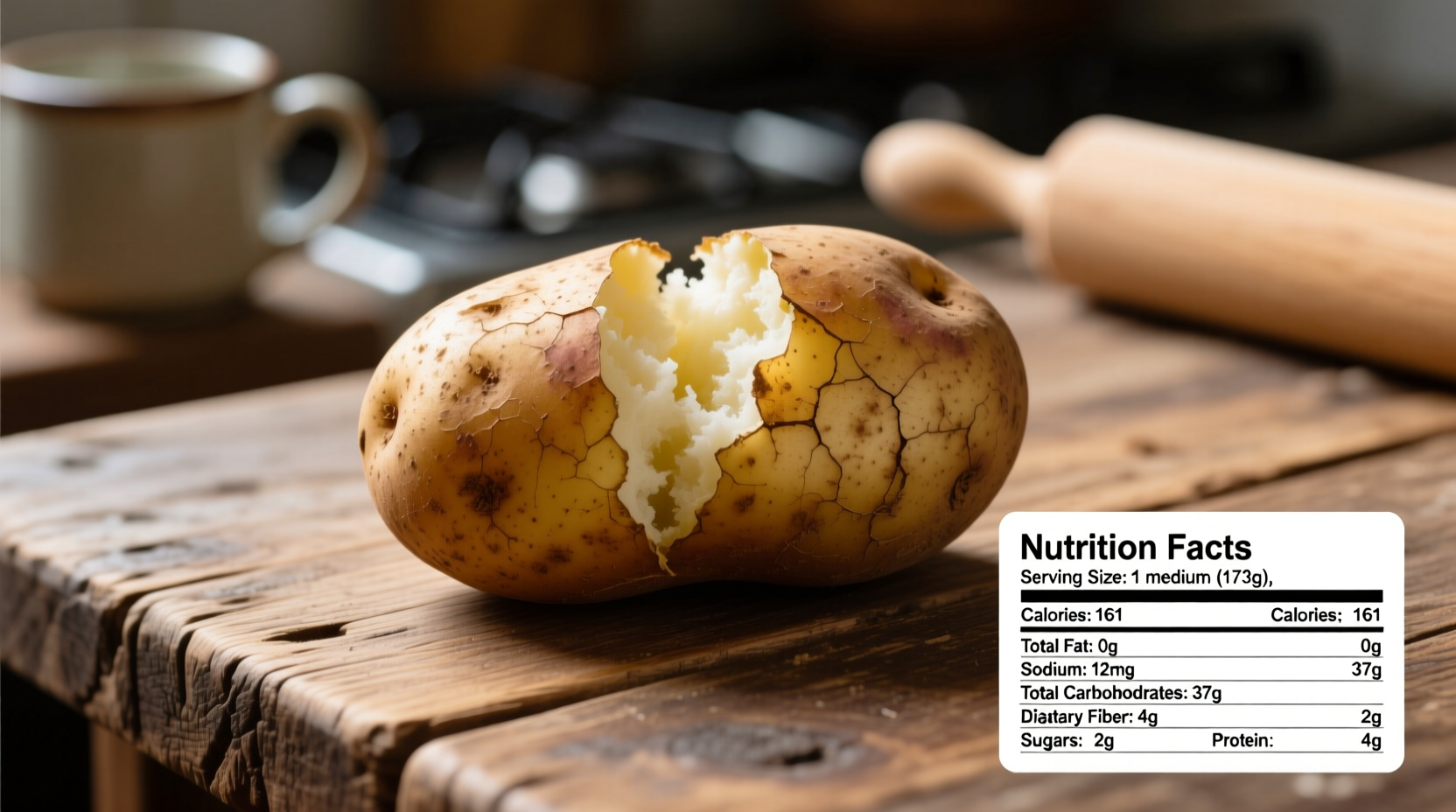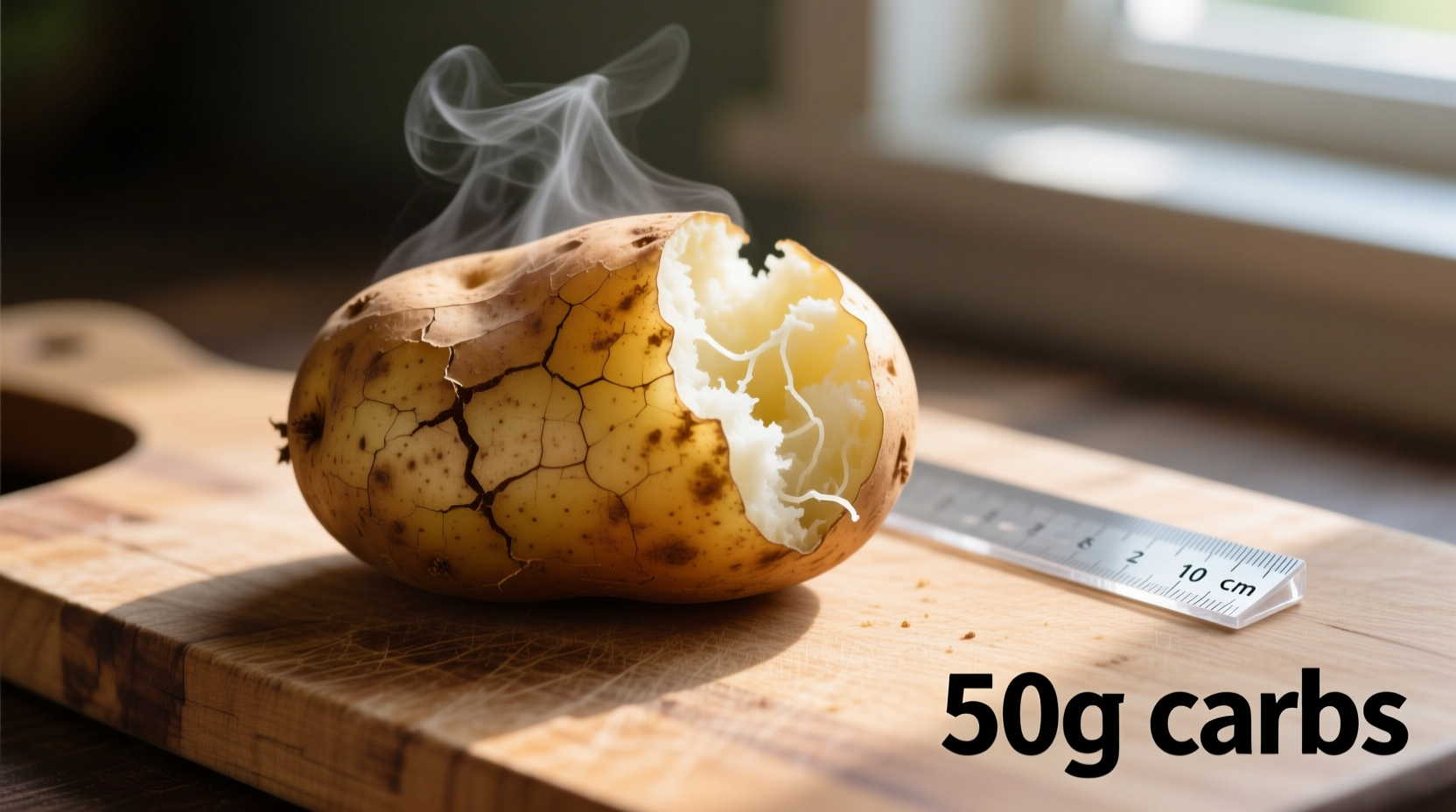Carbohydrate Content in Baked Potatoes: What You Need to Know
When tracking your daily carbohydrate intake for health management, weight loss, or specific dietary needs, knowing the precise carb count in common foods is essential. Baked potatoes are a staple in many diets, but their carbohydrate content often causes confusion. Let's break down exactly what you're consuming.
Understanding Potato Carbohydrates
Baked potatoes contain three types of carbohydrates: starch (the majority), dietary fiber, and a small amount of natural sugars. The starch content is what makes potatoes a significant carbohydrate source, while the fiber contributes to satiety and digestive health.
According to the USDA FoodData Central database, the carbohydrate content varies significantly based on potato size. This is crucial information for those carefully monitoring their carb intake for diabetes management or low-carb diets.
| Potato Size | Weight (grams) | Total Carbs | Dietary Fiber | Net Carbs* |
|---|---|---|---|---|
| Small | 138g | 29g | 2.1g | 26.9g |
| Medium | 156g | 37g | 3.8g | 33.2g |
| Large | 259g | 59g | 6.3g | 52.7g |
| Jacket (with skin) | 173g | 37g | 3.8g | 33.2g |
*Net carbs = total carbs minus fiber
This nutritional data comes directly from the USDA's official FoodData Central database, the most authoritative source for food composition information in the United States (fdc.nal.usda.gov). The values represent plain baked potatoes without any added toppings or seasonings.
How Preparation Affects Carb Content
Many people wonder if baking method changes the carbohydrate content of potatoes. The good news is that cooking method itself doesn't significantly alter the total carbohydrate count. However, what you add after baking dramatically impacts the final carb count:
- With skin: Eating the skin adds minimal additional carbs but provides valuable fiber (about 2 grams more than without skin)
- Butter or oil: Adds fat but negligible carbs
- Sour cream: 1 tablespoon adds approximately 0.6g carbs
- Cheese: Typically low in carbs (about 0.4g per tablespoon of cheddar)
- Salted butter: Virtually no carbs
- Sugar-based toppings: Can add significant carbs (e.g., brown sugar adds 13g per tablespoon)
For those following low-carb diets, the skin actually provides additional fiber which can be subtracted from total carbs when calculating net carbs.
Baked Potato in Dietary Context
Understanding how baked potatoes fit into different dietary approaches requires looking beyond just the carb count:
Glycemic Index Considerations
Baked potatoes have a relatively high glycemic index (around 85-90 on a 100-point scale), meaning they can cause rapid blood sugar spikes. However, this changes significantly when eaten with:
- Fat (like olive oil or butter)
- Protein (such as Greek yogurt or cheese)
- Acidic components (like vinegar in coleslaw)
These combinations can lower the overall glycemic load, making potatoes more suitable for people managing blood sugar levels. The American Diabetes Association notes that portion control and smart pairing make potatoes viable in diabetes meal plans when properly managed (diabetes.org).
Comparison to Other Carbohydrate Sources
When evaluating whether to include baked potatoes in your meal plan, comparing them to other common carbohydrate sources provides helpful context:
- 1 medium baked potato (150g): 37g total carbs
- 1 cup cooked white rice: 45g total carbs
- 1 large banana: 31g total carbs
- 2 slices whole wheat bread: 24g total carbs
- 1 cup cooked quinoa: 39g total carbs
While potatoes have a similar carb count to other staple foods, they offer unique nutritional benefits including potassium, vitamin C, and vitamin B6.
Practical Tips for Managing Carb Intake
If you're monitoring carbohydrate intake but still want to enjoy baked potatoes, consider these practical strategies:
- Portion control: Opt for small potatoes (138g) which contain about 29g total carbs
- Cool before eating: Letting baked potatoes cool creates resistant starch, which behaves more like fiber in the body
- Pair wisely: Combine with protein and healthy fats to slow carbohydrate absorption
- Track toppings: Be mindful that loaded potato toppings can double the carb count
- Consider frequency: For strict low-carb diets, limit potatoes to occasional consumption
For those following very low-carb diets like keto (typically 20-50g carbs per day), a single medium baked potato would exceed daily limits. In these cases, cauliflower mash provides a lower-carb alternative with only about 5g net carbs per cup.

When Baked Potatoes Fit Your Dietary Needs
Baked potatoes aren't appropriate for all dietary approaches, but they can be valuable in many eating patterns:
- Active individuals: The complex carbohydrates provide sustained energy for physical activity
- Weight management: High fiber content promotes fullness when eaten with skin
- Post-workout: Ideal for replenishing glycogen stores after intense exercise
- Balanced diets: Contribute valuable nutrients when portion-controlled
The key is understanding your personal carbohydrate tolerance and daily needs. The Dietary Guidelines for Americans recommends that carbohydrates make up 45-65% of daily calories for most adults, which translates to 225-325 grams of carbs for a 2,000-calorie diet (dietaryguidelines.gov).
Common Questions About Potato Carbohydrates
Many people have specific questions about how different factors affect the carbohydrate content of baked potatoes:
- Does cooling a baked potato reduce its carb content? (No, but it increases resistant starch)
- Are sweet potatoes lower in carbs than regular potatoes? (Slightly, but similar total carb count)
- How do different potato varieties affect carb content? (Minimal variation between common varieties)
- Does microwaving versus baking change the carb count? (No significant difference)











 浙公网安备
33010002000092号
浙公网安备
33010002000092号 浙B2-20120091-4
浙B2-20120091-4